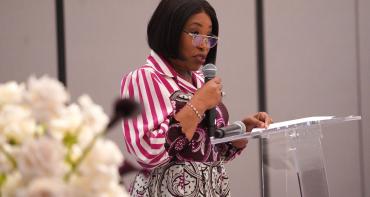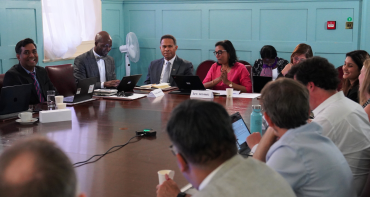The ĚÇĐÄĚ˝»¨ and United Nations Office for Outer Space Affairs (UNOOSA) this week signed a joint declaration to maximise the solutions that space technology, innovation and collaboration offer. The agreement covers not only climate and environmental resilience but also access to distance learning education opportunities, and equitable access to services.Â

It was the first declaration signed by the Commonwealth Secretary-General, Hon Shirley Ayorkor Botchwey, since taking office in April.
Secretary-General Botchwey reflected on the declaration as a practical and powerful statement of intent, she said:
“It signals our determination to ensure that outer space becomes a force for sustainable development here on Earth – and that no country, no community, is left behind.
“Together, we want to democratise access to space-based solutions – and unlock their potential for every country, including those with limited space infrastructure of their own.”

She noted in her remarks at the ĚÇĐÄĚ˝»¨ headquarters, Marlborough House:
“I look forward to seeing the work that follows; work that places space technology at the heart of sustainable development, and the Commonwealth at the forefront of inclusive global innovation.”
UNOOSA Director Aarti Holla-Maini welcomed the stronger partnership with the Commonwealth. She said:
"UNOOSA is not here for glory, and we don't believe in isolated partnerships and silos, we are here to drive results. Let the metrics we celebrate be farmers reached through drought advisories, schools and villages brought online, and youth-led start-ups that transform raw satellite pixels into prosperity and progress."

A thought-provoking panel discussion followed the signing ceremony with panellists representing national space agencies, AI innovators and the private sector.
Harshbir Sangha, Director of Missions & Capabilities at the UK Space Agency, spoke about his organisation’s long-time work with UNOOSA and the benefits of collaboration, especially on studies relating to climate impact and “how to bring it back to Earth”. He shared sobering facts:
“There are 400 million in India that are always at risk of flooding. That is five times the population of the UK at constant risk. Anything anyone does in space has benefits, and so we are always in favour collaboration.”
Kyle Whitehill, Avanti Space CEO, said that there are communities in the world that are being left behind because of the lack of reliable connectivity. The company’s work with the banking sector in South Africa has been a revelation on the importance of connecting people to necessary services – through satellite technology.
In the past, South Africa was experiencing widespread scheduled power cuts and the banking sector signalled that, to prevent civil disorder, people would need to have access to financial transactions. Without electricity, telecommunications are often affected. However, satellite-driven solutions allow banks to service people’s basic financial needs during those times. Mr Whitehill shared:
“When you lose power, you lose terrestrial connections and all data centres are gone and banking transactions go through data centres. There are significantly lower power requirements of satellite use.
“Today we have a fully resilient banking system, even with the complete loss of power.”
The panellists included: Lorant Czaran, Acting Head of Space Applications Section, UNOOSA; Alex Fortescue, Senior Manager, Africa Maxar Technologies; Atsushi Takata, Executive Vice President, Global Strategy, SpaceData Inc.; Will Marshal, CEO, Planet Labs; Nilesh Desai, Director, Space Applications Agency, India; and Vugar Bayramov, Adviser to Chairman, Azercosmos. The event was also attended by Commonwealth high commissioners and industry experts.
Read more
- Remarks by the Commonwealth Secretary-General, Hon Shirley Ayorkor Botchwey
- Remarks by the UNOOSA Director, Aarti Holla-Maini
Media contact
-
SunĂ© Kitshoff Senior Communications Officer, Communications Division, ĚÇĐÄĚ˝»¨
- M: +44 7740 450 901 | E-mail


